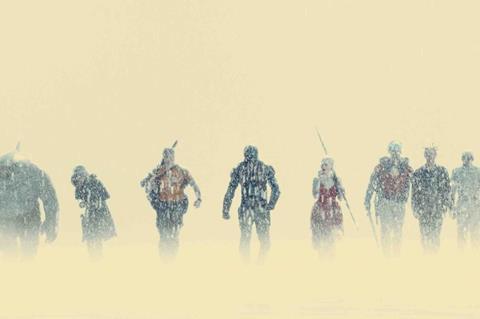‘Significantly better than the first’: James Gunn’s squad delivers for DC/Warners

Dir: James Gunn. US. 2021. 132 mins.
An invigorating blast of bloody, disreputable comic-book cinema, The Suicide Squad turns its titular criminals into a collection of lovable anti-heroes set loose in a dazzling, surprisingly emotional adventure. Not exactly a sequel to 2016’s Suicide Squad — more like another stab at the same milieu, featuring some of the same characters — the new picture is energised by writer-director James Gunn’s unapologetically gritty approach, which feels like a bracing antidote to the earnestness and forced gravitas so prevalent in superhero films. Margot Robbie and Idris Elba shine, balancing humour and edginess in a blockbuster studded with visual wonders and inspired set pieces.
Studded with visual wonders and inspired set pieces
The latest instalment in the DC Extended Universe arrives in the UK on July 30, hitting US screens (and HBO Max) on August 6. Will Smith, who starred in the 2016 film, isn’t in The Suicide Squad, but Robbie’s return as Harley Quinn ought to compensate, joined by newcomers John Cena and Peter Capaldi. The original film grossed nearly $750 million worldwide, so there is definitely demand for a follow-up, especially one that’s significantly better than the first.
Government agent Amanda Waller (Viola Davis) assembles a ragtag team of hardened prisoners, dubbed The Suicide Squad, to take out Jotunheim, a former Nazi lab hidden on an island off South America which is believed to still be conducting horrific experiments. The reluctant leader of the Squad, Bloodsport (Elba), must work with, among others, the bloodthirsty Peacemaker (Cena), and they’re soon joined by Harley Quinn (Robbie), the sole survivor of a separate mission to destroy Jotunheim. They apprehend the evil scientist Thinker (Capaldi), who reveals that the lab has been housing a fearsome interstellar creature, Starro, that, if unleashed, could destroy humanity.
Gunn, who previously directed the Guardians Of The Galaxy pictures, takes over the reins from from David Ayer here. While both series focus on a group of underdogs who join forces to save the day, Suicide Squad’s impudence previously felt strained, Gunn exudes a breezy confidence in this follow-up, delivering stronger action sequences and more glorious carnage. The Suicide Squad is far gorier and expletive-heavy than Gunn’s Guardians films, and he seems liberated by not having to appeal to family audiences.
Yet unlike, say, Deadpool, The Suicide Squad isn’t interested in simply being irreverent. Instead, amidst the adult humour and graphic violence, the follow-up gives its tough-talking characters a rugged nobility which is endearing, even touching. Elba is superb playing a grizzled mercenary who learns to care about others, although that doesn’t stop him from feuding with Peacemaker, who considers himself the superior warrior. But whether it’s the matter-of-fact gruesomeness — a walking, talking shark named King Shark (Sylvester Stallone) indiscriminately eats baddies along its path — or the vivid depiction of the beautiful, terrifying Starro, which is essentially a mammoth killer starfish, The Suicide Squad is both shrewder and more down-and-dirty exciting than the typical superhero entry.
It has also been fabulously conceived: Gunn’s entire creative team brings a level of energy and ingenuity that dwarfs most blockbusters. Henry Braham’s widescreen lensing makes The Suicide Squad’s inventive compositions a must-see in a theatre, while John Murphy’s rock-infused score consistently amplifies the onscreen intensity. Plenty of comic-book films rely on slow-motion, but Gunn and editors Fred Raskin and Christian Wagner utilise the technique to give sequences a balletic grace that’s equally clever and stunning — in particular during a showdown between Harley and a pack of soldiers who don’t realise who they’ve tangled with.
Robbie played Harley for the first time in the 2016 film, reprising the role for last year’s Birds Of Prey, but she’s never been so assured as she is here, worrying less about emphasising the character’s fractured psyche and, instead, leaning into her effortlessly childlike sense of menace. She’s joined in the lively ensemble by Daniela Melchior as the charming Ratcatcher 2, a Squad member who can control rats to do her bidding, and David Dastmalchian as the nerdy Polka-Dot Man, who amusingly draws on his unresolved tensions with his mother in order to justify killing people.
Indeed, there’s a scruffy warmth to The Suicide Squad that suggests just how much Gunn loves these reprobates, seeing them as misunderstood outcasts who, when the moment requires it, can draw on the best parts of themselves to actually be the good guys. That sympathetic perspective leads to a rousing finale that, without warning, may put a lump in your throat — a Squad goal you probably never saw coming.
Production companies: Atlas Entertainment, Peter Safran Productions
Worldwide distribution: Warner Bros.
Producers: Charles Roven, Peter Safran
Screenplay: James Gunn, based on characters from DC
Production design: Beth Mickle
Editing: Fred Raskin, Christian Wagner
Cinematography: Henry Braham
Music: John Murphy
Main cast: Margot Robbie, Idris Elba, John Cena, Joel Kinnaman, Sylvester Stallone, Viola Davis, Jai Courtney, Peter Capaldi






![The Brightest SunScreen[Courtesy HKIFF]](https://d1nslcd7m2225b.cloudfront.net/Pictures/274x183/3/5/0/1448350_thebrightestsunscreencourtesyhkiff_312678.jpg)















![The Brightest SunScreen[Courtesy HKIFF]](https://d1nslcd7m2225b.cloudfront.net/Pictures/100x67/3/5/0/1448350_thebrightestsunscreencourtesyhkiff_312678.jpg)

